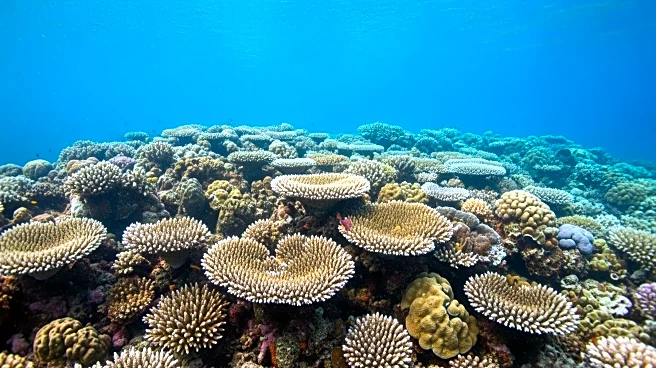What's Happening?
The world has reached its first major climate tipping point with the irreversible decline of warm water coral populations due to rising temperatures. This development marks a significant environmental
crisis, as the widespread dieback of coral reefs could have catastrophic global consequences. Experts are raising alarms about the potential impacts on marine biodiversity and the ecosystems that depend on coral reefs. The situation underscores the urgent need for global attention and action to address climate change and its effects on natural habitats.
Why It's Important?
The decline of coral populations is a critical issue because coral reefs play a vital role in marine ecosystems, supporting a diverse range of species and providing essential services such as coastal protection and tourism. The loss of these reefs could lead to significant disruptions in marine biodiversity, affecting fisheries and the livelihoods of communities that rely on them. Additionally, coral reefs contribute to the global carbon cycle, and their decline could exacerbate climate change impacts. This tipping point highlights the urgent need for international cooperation and policy measures to mitigate climate change and protect vulnerable ecosystems.
What's Next?
The irreversible decline of coral populations calls for immediate action from global leaders and environmental organizations. Efforts may focus on reducing greenhouse gas emissions, implementing conservation strategies, and investing in research to develop resilient coral species. Stakeholders, including governments, NGOs, and the scientific community, are likely to increase advocacy for stronger climate policies and funding for marine conservation projects. The situation may also prompt discussions on innovative solutions, such as coral restoration and artificial reef development, to mitigate the impacts of coral loss.
Beyond the Headlines
The decline of coral reefs raises ethical and cultural questions about humanity's responsibility to protect natural environments. It challenges societies to consider the long-term implications of environmental degradation and the legacy left for future generations. The situation also highlights the interconnectedness of global ecosystems and the need for holistic approaches to environmental conservation. As coral reefs face extinction, there may be increased interest in exploring the cultural significance of these ecosystems and their role in indigenous and local communities.











